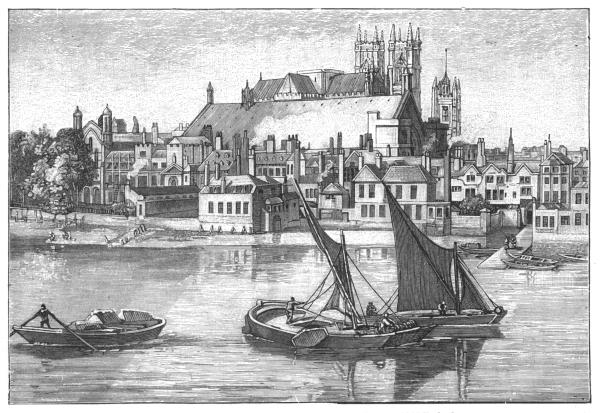|
The
History of London - George II
|
59. UNDER
GEORGE THE SECOND.
PART V.
It was estimated, some years later than the period we
are considering, that there were then in London 3,000 receivers of
stolen goods; that is to say, people who{219}
bought without question whatever was brought to them for sale: that the
value of the goods stolen every year from the ships lying in the
river—there were then no great Docks and the lading and
unlading were carried on by lighters and barges—amounted to
half a million sterling every year: that the value of the property
annually stolen in and about London
amounted to 700,000l.:
and that goods worth half a million at least were annually stolen from
His Majesty's stores, dockyards, ships of war, &c. The moral
principle, a writer states plainly, 'is totally destroyed among a vast
body of the lower ranks of the people.' To meet this deplorable
condition of things there were forty-eight different offences
punishable by death: among them was shoplifting above five shillings:
stealing linen from a bleaching ground: cutting hop bines and sending
threatening letters. There were nineteen kinds of offences for which
transportation, imprisonment, whipping, or pillory were provided: there
were twenty-one kinds of offences punishable by whipping, pillory, fine
and imprisonment. Among the last were 'combinations and conspiracies
for raising the price of wages.' The classification seems to have been
done at haphazard: for instance, to embezzle naval stores would seem as
bad as to steal a master's goods: but the latter offence was capital
and the former not. Again, it is surely a most abominable crime to set
fire to a house, yet this is classed among the lighter offences. It was
therefore a time when there was a large and constantly increasing
criminal class: and, as a natural cause or a natural consequence,
whichever we please, there was a very large class of people as
ignorant, as rude, and as dangerous as could well be imagined. I do not
think there was ever a time, not even in the most remote ages, when
London contained savages more brutal and more ignorant than could be
found in certain{220} districts
outside the City of the Second George. But these poor wretches had one
great virtue—they were brave: they manned our ships for us
and gave Britannia the command of the sea: they were knocked down,
driven and dragged aboard the ships by the press-gang. Once there they
fell into rank and order, carried a valiant pike, manned the guns with
zeal, joined the boarding party with alacrity and carried their
cutlasses into the forlorn hope with faces that showed no fear. They
were so strong, so stubborn, and so brave, that one sighs to think of
the lash that kept them in discipline and order. There is one more side
of London that must not be forgotten. It was a great and prosperous
city: we can never dwell too strongly on the prosperity of the city:
but there were shipwrecks many and disastrous. And the fate of the man
who could not pay his debts was well known to all and could be
witnessed every day, as an example and a warning. For he went to prison
and in prison he stopped. 'Pay what you owe,' they said to the debtor,
'or else stay where you are.' The debtor could not pay: in prison the
debtor had no means of making any money: therefore he stayed where he
was until he died. For the accommodation of these unhappy persons there
were the King's Bench and the Marshalsea, both in Southwark: there were
the two Compters, both in the City: and there was the Fleet Prison.
The life in these prisons can be found described in
many novels. It was a squalid and miserable life among ruined gamblers,
spendthrifts, profligates, broken down merchants, bankrupt tradesmen,
and helpless women of all classes. Unless one had allowances from
friends, starvation might be the end. In one at least the common hall
had shelves ranged round the walls for the reception of beds:
everything was carried on in the same room,{221}
living, sleeping, eating, cooking. And into such a place as this the
unhappy debtor was thrust, there to remain till death released him.
 THE
OLD HOUSES OF PARLIAMENT AND WESTMINSTER ABBEY, 1803.
THE
OLD HOUSES OF PARLIAMENT AND WESTMINSTER ABBEY, 1803. {222}This was the
London of a hundred and fifty years ago. No longer picturesque as in
the old days, but solidly constructed, handsome, and substantial. The
merchants still lived in the city but the nobles had all gone. The
Companies possessed the greater part of the City and still ruled though
they no longer dictated the wages, hours, and prices. Within the walls
there reigned comparative order: outside there was no government at
all. The river below the Bridge was crowded with ships moored two and
four together side by side with an open way in the middle. Thousands of
barges and lighters were engaged upon the cargoes: every day the church
bells rang for a large and orderly congregation: every day arose in
every street such an uproar as we cannot even imagine: yet there were
quiet spots in the City with shady gardens where one could sit at
peace: wealth grew fast: but with it there grew up the mob with the
fear of anarchy and license, a taste of which was afforded by the
Gordon Riots. Yet it would be eighty years before the city should
understand the necessity for a police.
London Sights to See
St. Paul's Cathedral
Buckingham
Palace
Elfin
Oak of Kensington Gardens
Shakespeare's
Globe Theatre
Harrod's
Department Store
Hyde
Park
Kensington
Palace and Gardens
Kew
Palace and Gardens
Madame
Tussauds Wax Museum and London Planetarium
Piccadilly
Circus
Royal
Observatory, Greenwich
The
West End
Trafalgar
Square
Westminster
Abbey
Whitehall
Sitemap
Home
Based Travel Business
Free
Advertising



